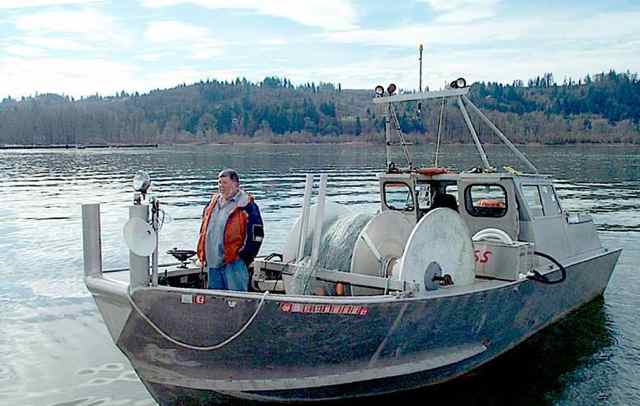forum
library
tutorial
contact

Thanks for Reporting Facts
by Jim WellsThe Daily Astorian, March 12, 2019
|
the film forum library tutorial contact |

|
Thanks for Reporting Factsby Jim WellsThe Daily Astorian, March 12, 2019 |
 After reading the letter "Don't support gillnetting" (The Daily Astorian, March 7), I felt compelled to offer a factual response.
After reading the letter "Don't support gillnetting" (The Daily Astorian, March 7), I felt compelled to offer a factual response.
The author states that all the fish in the Columbia River main channel are Endangered Species Act (ESA) listed. Up to 80 percent of returning salmon stocks are now of hatchery origin, and not listed. They are marked by a clipped fin to be later identified.
Of the remaining 20 percent, there are healthy runs of wild fish, such as Hanford Reach fall chinook and summer chinook that can be harvested for public use. The gillnet is a very selective tool to accomplish this, and has a long track record of staying within the National Oceanic and Atmospheric Administration's stringent ESA requirements.
The statement that the Columbia River endorsement fee on recreational licenses was intended to buy out or eliminate gillnetters is simply false. The money has been used for overall projected improvements to fisheries, including researching new off-channel select fishing areas (none were found viable), testing alternative gear (none proved to be better than gillnets), research and monitoring commercial fisheries, additional hatchery production to benefit both recreational and commercial fisheries, and commercial and recreational fisheries law enforcement.
I am fairly confident most of the hardworking blue-collar commercial fishing families in the lower Columbia don't worry much about the economy in Vancouver, Washington, where the author lives, but they sure care about their own, and so does The Daily Astorian.
We thank our local paper for reporting the facts and supporting rural people and jobs. As far as the huge "transfer of wealth" from urban to rural, as promised under the Kitzhaber Plan, after six years we are still waiting for the trickle-down to develop.
The Columbia River Reform Plan is now going through an adaptive management process that was built into it as a path forward if the plan failed -- and it has. For some people, that true fact is hard to accept.
Related Sites"
Fish Traps, Alternative To Current Commercial Fishing Methods, Being Tested In Lower Columbia Columbia Basin Bulletin, 12/15/17
ODFW Reopens Harvest Rules Focused On Phasing Out Mainstem Gillnets Below Bonneville Columbia Basin Bulletin, 12/15/17
Oregon Harvest Reforms Differ From Washington In How Much Gillnetting Allowed Columbia Basin Bulletin, 1/27/17
Washington Votes To Move Forward With Columbia River Harvest Changes, Oregon To Consider Similar Plan Columbia Basin Bulletin, 1/27/17
Washington, Oregon Fish/Wildlife Commissions On Parallel Course With Columbia River Harvest Reform Columbia Basin Bulletin, 12/9/16
Washington, Oregon Fish/Wildlife Commissions Considering Next Moves On Lower River GillnettingColumbia Basin Bulletin, 12/2/16
Oregon Commission To Review Columbia River Harvest Reforms, May Consider Extending Mainstem Gillnets Columbia Basin Bulletin, 11/4/16
Oregon Commission Hears Review Of Fishing Reforms Banning Lower Columbia Gillnetters From Mainstem Columbia Basin Bulletin, 4/22/16
Oregon ‘Re-Adopts' Lower Columbia Commercial Gill-Net Ban; Slew Of Uncertainties Remain Columbia Basin Bulletin, 6/7/13
learn more on topics covered in the film
see the video
read the script
learn the songs
discussion forum
